Exploring 10 of the Most Influential Early Video Games

The world of video games has come a long way since its humble beginnings. From simple pixelated graphics to immersive virtual worlds, video games have evolved into a multi-billion dollar industry that captivates players of all ages. However, it is important to recognize the pioneers that laid the foundation for the modern gaming landscape. In this article, we will explore 10 of the most influential early video games that revolutionized the industry and left a lasting impact on game design, storytelling, and player experiences.
Pong (1972)
Considered the first commercially successful video game, Pong set the stage for the future of gaming. Developed by Atari, Pong introduced the concept of digital table tennis and sparked a global phenomenon. Its simple yet addictive gameplay established the foundations of multiplayer gaming and showcased the potential of video games as entertainment.
Space Invaders (1978)
Space Invaders was a groundbreaking arcade game that popularized the shoot ’em up genre. Developed by Taito, this space-themed game captivated players with its relentless alien invasion and introduced innovative features such as progressive difficulty levels. Space Invaders set the standard for arcade gaming and demonstrated the appeal of high-score competition.
Pac-Man (1980)
Created by Namco, Pac-Man revolutionized the industry with its maze-chasing gameplay and iconic character. This maze game introduced the concept of power-ups and bonus items and appealed to a broader demographic, attracting both male and female players. Pac-Man’s success established video games as a cultural phenomenon and solidified the importance of character-driven experiences.
Donkey Kong (1981)
Donkey Kong, developed by Nintendo, introduced the world to its beloved mascot, Mario. This platform game featured innovative-level design, challenging obstacles, and a compelling storyline. Donkey Kong showcased the potential of storytelling in video games and laid the groundwork for future narrative-driven experiences.
Super Mario Bros. (1985)
Super Mario Bros., the iconic platformer developed by Nintendo, revolutionized the gaming industry and propelled Mario into superstardom. With its meticulously designed levels, innovative power-ups, and memorable music, Super Mario Bros. set the gold standard for side-scrolling platform games and cemented Mario as one of the most recognizable characters in gaming history.
The Legend of Zelda (1986)
Developed by Nintendo, The Legend of Zelda introduced the world to a vast, open-ended fantasy adventure. With its non-linear gameplay, immersive world exploration, and intricate puzzles, this action-adventure game redefined the genre and inspired countless future game developers. The Legend of Zelda demonstrated the power of immersive storytelling and player agency in video games.
Tetris (1984)
Created by Russian game designer Alexey Pajitnov, Tetris is a timeless puzzle game that captured the hearts of players worldwide. It is addictive gameplay, and simple yet challenging mechanics made it a global phenomenon. Tetris showcased the universal appeal of puzzle games and established the genre as a staple in the gaming industry.
Street Fighter II (1991)
Street Fighter II, developed by Capcom, popularized the one-on-one fighting game genre. With its diverse roster of characters, intricate move sets, and competitive multiplayer gameplay, Street Fighter II revolutionized arcade gaming and sparked the phenomenon of competitive gaming, known as eSports, that continues to thrive today.
Doom (1993)
Doom, created by id Software, pioneered the first-person shooter genre and set new standards for immersive gameplay and multiplayer experiences. Its fast-paced action, realistic graphics (for its time), and modding capabilities made it a groundbreaking title that influenced countless future FPS games.
Final Fantasy VII (1997)
Final Fantasy VII, developed by Square Enix, redefined the role-playing game (RPG) genre with its cinematic storytelling, complex characters, and innovative gameplay mechanics. Its compelling narrative, emotional depth, and stunning visuals set a new benchmark for RPGs and solidified the franchise’s place as a beloved gaming series.
These ten influential early video games not only shaped the gaming industry but also captured the imaginations of players around the world. Through their innovative gameplay, memorable characters, and groundbreaking features, these games laid the foundation for the immersive and diverse gaming experiences we enjoy today. As the industry continues to evolve, it is important to acknowledge the pioneers who pushed the boundaries of what video games can achieve and paved the way for the vibrant and thriving gaming community we know today.
Disclaimer
This article is for educational and informational purposes only. While HistoryReveal.com strives for accuracy, historical interpretation may vary, and readers are encouraged to consult additional sources for deeper study.